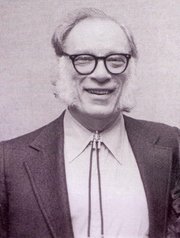20 facts about Isaac Asimov that I would like to remember

I credit Isaac Asimov for my long-time fascination with the genre of science-fiction. Asimov (mostly) and Arthur C. Clarke were mostly what I read at the end of my school days. I was browsing through Wikipedia today and caught a recent feature by them on Asimov. The wikipedia entry on Asimov was fascinating - there were so many facts about him that I didn’t know. So I decided to create a short self-reference of facts that I would like to remember of this great man. So here is my list of 20 facts about Asimov, the content of which was shamelessly picked out of Wikipedia. I consider this as my “ode” to The Man.
Isaac Asimov (c. January 2, 1920 - April 6, 1992)
- He was an exceptionally prolific writer. He wrote or edited over 500 volumes and an estimated 90,000 letters or postcards and has works in every major category of the Dewey Decimal System exept Philosophy. His personal papers archived at Boston University’s Mugar Memorial Library consume 464 boxes on 232 feet (71 meters) of shelf space.
- Asimov died from AIDS related complications. He contracted HIV from an infected blood transfusion during heart bypass surgery in 1983. The cause for his death was kept secret by his widow for over a decade after his death.
- Likes/dislikes: Asimov was afraid of flying. He only flew twice in his life. He was also a claustrophile, i.e. he enjoyed small,enclosed spaces.
- Associations: He was a staunch democrat. He was also a member of Mensa.
- Honours: The asteroid 5020 Asimov is named after him. So is Honda’s humanoid prototype robot ASIMO.
- Early life: Asimov taught himself to read at the age of five. His interest in science fictions magazines led him to write his own, and by his mid-teens he was selling his stories to pulp magazines. “Marooned Off Vesta” (1939) was his first published story, written when he was 18. Two and a half years later, he published his 32nd short story “Nightfall” (1941), which is considered by some as one of the most famous science fiction stories of all times. In 1968, the Science Fiction Writers of America voted it to be the best science fiction short story ever written.
- He graduated from Columbia University. Also got his Ph.D. in Chemistry there. He thereafter joined the faculty in Boston university and remained associated with it till the end.
- In his Foundation series he developed a fictional science of Psychohistory, in which the future course of the history of large populations can be predicted.
- In his robot series “I, Robot”, he developed the “Three Laws of Robotics” - a set of rules of ethics for robots and intelligent machines that has greatly influenced the way writers and thinkers in the field look at the subject.
- For the film “I, Robot” featuring Will Smith, Asimov’s ideas were incorporated as well after the process of acquiring the rights to the title (since it was identical to Asimov’s robot series).
- He published a 1300 pages, two-volume “Asimov’s Guide to the Bible” covering the Old and the New Testament. The publications covered all the books of the bible.
- He wrote three auto-biographies - the last one published after his death. His widow Janet Asimov also came out with a condensed version of his three autobiographies, which incidentally revealed the real cause of his death for the first time.
- Asimov has been criticized for the lack of sex and aliens in his science fiction. He explained the reason behind his overlooking of aliens to an incident early in his career when a story of his was rejected because he portrayed aliens to be superior to humans. So rather than depicting aliens as weak, he decided to not write about them at all. In response to all these criticisms, he wrote “The Gods Themselves”, which contained aliens, sex and alien sex. He considered a part of this book to be one of the best he had written.
- Towards the end of his life he published a series of collections of limericks, mostly written by himself. He also wrote the “Treasury of Humor” which was partly a treatise propounding his views on humor theory.
- He considered the 1950s to be his “golden decade”. He wrote science fiction mostly in the first two decades and in the last decade of his life. For the rest of his life he wrote non-fiction, mostly in the area of popular science - explaining science to the common man.
- His first wide ranging reference work was “The Intelligent Man’s Guide to Science”. The popularity of this book allowed him to retire from academics and become a freelancer.
- He started writing a monthly non-fiction column in the Magazine of Science & Science Fiction on November 1958, in which he was given complete editorial freedom by the publisher. He wrote uninterrupted in this magazine till his death with 399 entries in the column.
- Asimov was once quoted as saying that he didnt want to be remembered for any one book or many books. He wanted to be remembered for his total quantity, quality and variety, which he felt can’t be duplicated by anybody else.
- Asimov is credited for coining the word “robotic” and “robotics”.
- The Isaac Asimov homepage - http://www.asimovonline.com. The Isaac Asimov wikimedia page - http://en.wikipedia.org/wiki/Isaac_Asimov
My two favorite quotes from Asimov:
- “If my doctor told me I had only six minutes to live, I wouldn’t brood. I’d type a little faster”
- “I prefer rationalism to atheism. The question of God and other objects-of-faith are outside reason and play no part in rationalism, thus you don’t have to waste your time in either attacking or defending”